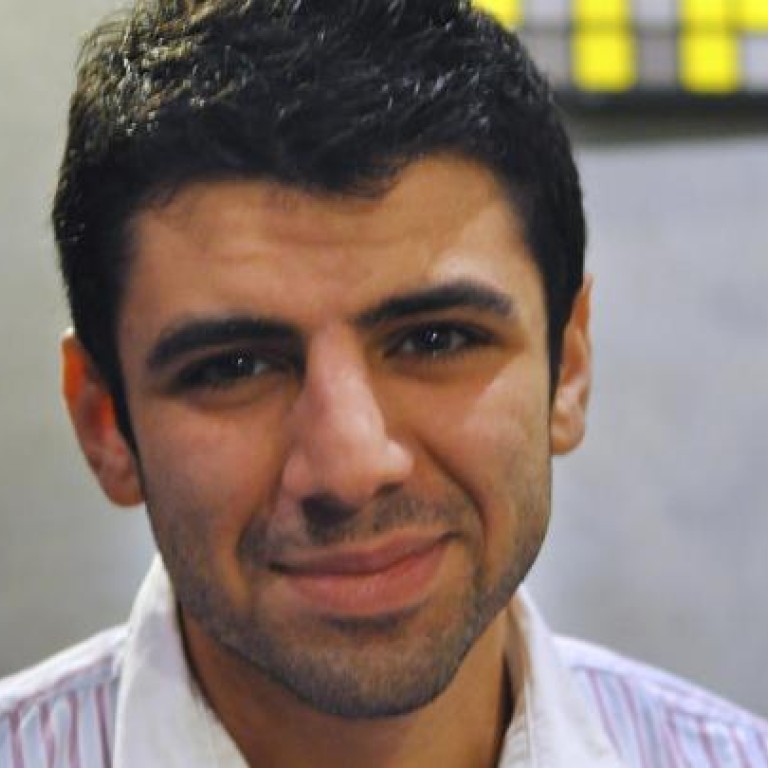
Changing faces: Syrian Fadi Chehne sees his future in China
University student masters Putonghua and prepares to take over his father's business while keeping a keen eye on war back home
Four years ago, Fadi Chehne moved to China with his father, who wanted to pursue new business opportunities in Asia when the economic crisis hit the West. The 24-year-old, who was born in Syria and grew up in Morocco, studies international trade in Beijing. Although he did not want to move initially, he now sees a future for himself in China. He recently sat down at a pizza restaurant, where he works part time as a manager, to discuss business, culture, the civil war in his homeland and his personal beliefs.
I am from Syria. At the age of five or six, I moved to Morocco with my family. I speak English, French, Spanish, Mandarin, Syrian Arabic and Moroccan Arabic. The two Arabic languages are different from each other, just like Cantonese and Shanghainese are not the same.
I came here four years ago because my father wanted to start a new business in Guangzhou. He has three restaurants in Morocco that serve Arabic food. Some people travel several hours to eat at my father's restaurants. We deliver about 75 sandwiches to the King's palace every day. My father used to know a lot of Chinese people from the embassy in Morocco, and he has many friends doing trade between Morocco and China. In time, he got the idea of coming to China.
It was my father's plan. I was against it initially, because I was a teenager who did not know anyone in China. But my father told me not to worry. There was an economic crisis, and he believed that China would have better opportunities. Now I love Beijing, and speaking Mandarin with a Beijing accent feels very good.
I learnt Mandarin in Beijing for two years, and now I study international trade at the University of Science and Technology Beijing. I have passed the sixth level of the HSK [also known as the Chinese Proficiency Test], just two notches below the top level.
I am thinking about running my father's business. He told me that China is the best country for work opportunities - I did not realise this before, but now I do. My father bought an office in Guangzhou and is waiting for me to graduate. My father's friends have factories making shoes, carpets and other things in Morocco, Syria and Australia. They ship goods from China. They have known my father for a long time and they trust him. They need someone like me who can speak Mandarin well to help handle their business arrangements, to make sure everything goes smoothly.
To me, Chinese culture is very beautiful. I am Muslim. We are told to do good things and to not lie or steal. Chinese people teach their children the same things. Chinese people may not be very direct - sometimes when you ask them a question, they may not answer you directly, or they may pretend not to hear you. What I dislike most about Beijing is that there are too many people and too much traffic. Still, compared with the West, Chinese culture is more similar to ours. I can understand many cultures. I have a Cuban girlfriend.
No, she's Christian. There are two differences between Muslims and Christians. First, we both believe in God, but the messenger is different - in Christianity, they believe the messenger, Jesus, is the son of God, but we, Muslims, believe that God has no sons, no parents. God is God. Secondly, the book, the , has too many versions; but in Islam, the is the only miracle through which God speaks to his people.
Yes, of course. I used to return to Syria for visits often, but I have not been back for four years, since I came to China. My mother is still there. I love Syria. The situation there right now is very, very bad. My uncle is in the army of Bashar al-Assad's regime. He was told that the problems were not created by Syrians, but from outside. My uncle told me that revolutionaries were carrying weapons made in America.
My mother went there before the war to see my grandmother, who was sick. She cannot leave now. Every 100 metres, there are checkpoints with guards - you don't know if they belong to the revolutionaries or if they are the police. It is very dangerous. I talk to my mother when the internet is working. I miss her.
Strategically, Syria is a very important place because it is next to Israel. Israel is like the US' spoilt child. Whatever Israel wants, America will do. Syria and Israel have had territorial disputes for a long time. Americans have made trouble in Libya, in Iraq. But they could not do the same in Syria because we have help from China and Russia. Why does the US want to be the global policeman? It makes no sense.
My best friend is from northeast China. I also have friends from Shanghai and Beijing. I have friends from America, Australia, Brazil, Cuba, France, Spain and Italy. I know some Americans who are fine with what their people are doing in Syria. I respect their point of view, but I would not be good friends with them.
I have no idea. I might have stayed in Morocco, fighting for a university place. I would not have done as much as I have here - learning new languages and meeting people from many countries.

